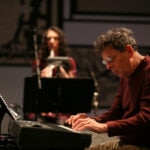The Frontiers of Knowledge Award goes to Philip Glass for forging a unique musical style
The BBVA Foundation Frontiers of Knowledge Award in Music and Opera has gone in this fourteenth edition to Philip Glass “for his extraordinary contribution to musical creation and opera, with a major impact in the music history of the 20th and 21st centuries,” in the words of the award committee.

Born in Baltimore, Maryland, United States, in 1937, music immediately found a space in his life. His father owned a record store, and the young Glass’s early exposure to classics like Beethoven, Shostakovich or Bartók encouraged him to begin studying flute and piano at seven years of age.
“Philip Glass has embraced different cultural traditions from all over the world, forging a unique and individual style and pursuing his own path with courage and conviction.” Glass, the citation adds, is “an international figure appealing to audiences of all generations. His work is performed in the most important opera houses and by leading musical ensembles around the world.”
“Philip Glass ha abarcado diferentes tradiciones culturales de todo el mundo, forjando un estilo único y personal y siguiendo su propio camino con valor y convicción”. Además es “una figura internacional que atrae a un público de todas las generaciones y cuyas obras se interpretan en los auditorios más importantes y por las principales formaciones orquestales de todo el mundo”, se destaca en el acta.
Asked about the evolution of his creative style, which Glass at one point defined as “an attempt to integrate three musical elements: melody, harmony and rhythm,” he insists today that what interests him more is “redefining the elements. Instead of talking about harmony, melody and rhythm, let’s talk about language, imagination and intuition. The language of music can be highly specific, depending on where, when and with whom you study. The language of music is what we learn to play and listen to. The other two elements, imagination and intuition, are actually more important. Without imagination and intuition, music has no real meaning.”
His breakthrough: Einstein on the Beach
Philip Glass’s novel way of composing did not initially find favor with the American public, who considered him more of a performative or protest artist than a musician. Víctor García de Gomar, committee secretary and Artistic Director of Barcelona’s Gran Teatre del Liceu, reflects on those early days: “At first he was not successful on the music circuit, and was better known in New York’s galleries. The art establishment saw him more as the creator of acts of cultural resistance employing a distinctly individual sound language.” In fact, in 1976, at the time of the premiere of his opera Einstein on the Beach – seen as his first great work and the one that won him significant acclaim – Philip Glass was still earning a living from his “day” jobs as a taxi driver and electrical appliance repairman. But Einstein on the Beach “broke every rule about what an opera was then supposed to be.

Glass_Philp ©FundaciónBBVA
“The most significant issues of our times”
The award committee underlines the composer’s willingness to address “the most significant issues of our times.” We can see this in his “Qatsi Trilogy” (1981-1982) with filmmaker Godfrey Reggio, three experimental, non-narrative films that are all about the images and the music. The first and best known, Koyaanisqatsi, (a word in the Hopi language that translates approximately as “life out of balance”), is a reflection on the dangers of a society leaning too heavily on technology, the balance of power between nature and hyper-technified human beings, between the organic and the mechanical.
Philip Glass is the author of an extensive catalog of works spanning multiple genres and every type of musical ensemble. The list includes more than 26 operas, large and small, notably the aforementioned Einstein on the Beach (1976), Satyagraha (1979) and Akhnaten (1983), and The Voyage (1992), commissioned by the New York Metropolitan Opera to commemorate the fifth centenary of Christopher Columbus’s arrival in the Americas. He has also written fourteen symphonies, thirteen concertos, nine string quartets and works for solo instruments like the piano or organ.